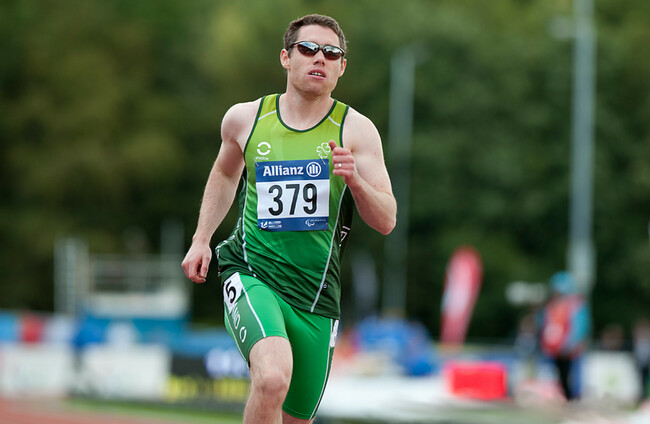THERE ARE FEW Irish athletes whose achievements on the world stage can genuinely be described as unprecedented, but Jason Smyth belongs in this category.
The Derry native is the fastest Paralympian on the planet, having achieved a personal best time of 10.22 seconds in the 100m at the London 2012 Paralympics.
Aged 31 and having competed at the top level of the sport for more than a decade now, Smyth remains unbeaten in his class.
Overall, he has won 16 major Para Athletics medals, including five Paralympic golds and seven World Championship triumphs.
And yet there is still a sense that Smyth, for all he has done, remains somewhat underappreciated within Irish sport.
Last year, he spoke of getting “more British media coverage than I did in Ireland”. While someone with his feats in a more high-profile and better funded sport would be a millionaire and set financially for life, Smyth is well aware of the precarious nature of a career in his sport as well as the need to seek an alternative career path sooner rather than later.
“If I had achieved what I have but in another sport… If I’m in not in Para Athletics, I’m just in athletics, I’m in boxing, you name the sport, I wouldn’t have to look at what job I’m going to be doing the minute I finished,” says Smyth, who is an ambassador for the World Para Swimming: Allianz European Championships in Dublin this week.
I don’t say it to feel bad about it or to be negative about it, it’s just simple facts. In 90% of sport, it would be very different. So it can be frustrating, but it’s not something on my own that I’m going to change.
“I can just continue to perform and continue to be the best and maybe it does change in time. You need people who are going to pave the way and push the sport forward to get the recognition it deserves.”
Of all Smyth has achieved, London 2012 remains the standout moment, for his exceptional performance and the amazing atmosphere it generated. As well as triumphing at the Paralympics that year, he came desperately close to competing in the Olympics, missing the 100m A-standard by just 0.04 seconds.
While he has managed to maintain his standards of excellence since then, Smyth’s career has not been devoid of setbacks. An injury suffered in 2013 prompted him to eventually get surgery in 2015.
“I remember at one point thinking ‘I don’t know if I’m able to get back to the level I was at,’” he recalls.
However, Smyth returned in time for the 2016 Olympics and emulated his feats of four years previously in London, and eight years before in Beijing, by claiming gold in the 100m T13.
Yet as glorious as these magnificent highs tend to be, the four years in between can often be a major slog.
“When I look back, there have been times when I have been highly motivated. I’d never say I’m low on motivation, but there are highs and lows within that,” Smyth explains.
“2012 has been the greatest moment of the experience — the atmosphere and the adrenaline. Then all of a sudden, you come round to next year and you race somewhere where there’s nobody [watching] and it just feels a bit pointless. How do you get yourself motivated to be at that top level to perform at your best, even though it feels like it doesn’t matter?
“I’ve found that a lot from 2012 to 2016. I think at this stage, it’s finding other ways of getting motivation. You can’t rely on it being the number of people who are in the stadium.
“Recently, I find the more I come towards the end of my career, the more I feel motivated to make it last longer and to enjoy it, because you feel the end coming. At different times, it’s finding different things that motivate. I’ve been fortunate enough, where I’ve probably been through enough cycles where I’m up and down a little bit, whereas sometimes other athletes, once they have the down, you never actually see them again.
“In sport, the mental side of things is massive and how you bounce back and keep yourself pushing forward, even though sometimes you don’t feel like it. It’s very easy to give up and say: ‘You know what, I’ve done everything I wanted to achieve.’ It’s a real skill to keep at that level — sometimes your mind’s not wanting to stay there.”
Yet despite these inevitable challenges, Smyth says he has never felt the need to contact a sports psychologist.
“Maybe it’s just me in life too, I’m just very consistent. I’m not a very up-and-down person. Maybe my personality suits that ability to, no matter what the situation is, trust in myself.
“I’d be constant in the little things that sometimes people neglect and that’s the stuff that you don’t see the benefit of right now. But where you do see the reward of it is the fact that you’ve been able to be in the sport for such a period of time, 13 years, and still no doubt I’ll definitely go on to Tokyo.”
It’s been a remarkable rise for someone who almost fell into athletics by accident. As a 16-year-old in Limavady Grammar School, his PE teacher, Liz Maguire, recommended that he try out for the local athletics club. More of a soccer player at the time, Smyth was not especially pushed about the idea but went along with it anyway.
“To be honest, I wasn’t too bothered about going, but I didn’t really want to say ‘no’. I kind of went to just to please her nearly and that was the night I met the guy who coached me all the way up to 2012, Stephen Maguire.
“If there’s a lesson for me, and for anybody, you don’t actually realise what opportunities are right in front of you. It would have been very easy for me not to go. I didn’t have any desire to really go. It’s crazy looking back how much of an impact me deciding to go and saying ‘yes’ had on where I am now — something that seemed so irrelevant [at the time].”
At the age of eight, Smyth was diagnosed with Stargardt’s disease, which affects his central vision. He ultimately found that he was more suited to athletics than soccer, though he plays down the impact of this problem on his sporting prowess.
“As I got bigger and [football] became longer visually, it was always going to be the challenge, but if I had the ball at my feet, I could run past anybody,” he remembers.
“Even when I played football, I didn’t see myself as disadvantaged, even though I had a huge disadvantage.
I see myself as being just as able as anybody else. And just as able to do better than 90% of people who I played along with. So I never seen myself as any different. But there’s no doubt that if I honestly look at moving forward in life and what I want to do after sport, there are things that you just aren’t really able to do.
“[In terms of] careers afterwards, I can’t drive a bus. I’ve never let anything hold me back, but there are times where I accept you are just limited in what you can do.”
Speaking of life post-athletics, Smyth has already been dipping his toe in the water in that regard, having undertaken internships in a bank and an investment firm of late. Yet he is still in the process of figuring out exactly what he wants to do, and at this point in the year, such concerns will inevitably be put on the back-burner owing to his sporting commitments.
“The reality is I’m training six days a week. Regardless of what else you’re trying to do, you can’t fully dedicate yourself to something,” he adds.
In addition to this intense training schedule, Smyth also now has another priority in his life. Last May, his wife Elise gave birth to a baby girl, Lottie. He also has a two-year-old daughter, Evie.
“The first child probably changes your outlook more on things in general,” he says. “With the second one, you’re a bit more in the swing of things.
“But to be honest, I haven’t really stopped training. Friday night, the baby arrived, and I was back in on the Monday. You can’t really stop in a major championship. But I suppose where it has a major impact is in the recovery. And obviously, how you recover is massive in terms of how you’re able to train. So yeah, there have been a few challenges and it’s about adjusting to what the new normal is. Generally, I’m happy with where I’m at, but we’ll see, next week really is where it counts.”
Smyth is referring, of course, to next week’s European Championships in Berlin. He is confident about his chances of retaining his famous unbeaten record having run a season’s best just a couple of weeks ago. As usual, everyone will be expecting him to win gold, to the point that a silver or bronze medal — incredible feats in their own right by most people’s standards — would seem like a disappointment.
“The reality is a lot of people can go to work and feel 80% and get through the day and feel able to be able to do what they need to do.
“But in sport and at this level of performing, you’ve got to be 100% or very close to it, otherwise it can have a massive impact. It’s definitely been a challenge trying to balance [sport with having children]. There’s no doubt that it does have an impact. The reality is, as an athlete, even five or six years ago, all I did was eat, sleep and train, I was based out in the States with some of the best athletes in the world. Everything was very conducive to being at your very best.
Now, there are so many other things going on in life. There is always an answer to it, but it’s finding an answer. It’s not what you used to do four or five years ago. You’re in a completely different situation and circumstance in life and you’re continually trying to battle to solve the problem and find out how you can get the most out of you as an athlete with the situation you’re in.”
In sport, we tend to especially mythologise the fallen idols — those who burn out rather than fade away, the George Best-type geniuses. The longevity and recurring dominance of athletes like Smyth in their chosen field might seem almost boring to casual observers by comparison, and it is perhaps part of the reason why the successes of the Derry native and those who attain similar levels of consistent brilliance can sometimes be unjustifiably overlooked or underrated. Yet it feels about time that Smyth, in particular, is celebrated as an Irish sporting great.
“One of the big things is believing that you can do it really,” he concludes. “I never came from any better of a situation than anybody else.
“I never had any more of an opportunity to start with than anybody else. I have a talent at running and everybody has talents. It might not be sport, it might be something else. The fact is that everybody has something that they’re incredibly good at. It’s so easy to doubt yourself and so easy to look at what you can’t do and beat yourself up about it. But the mind is incredibly powerful and if you’re able to use it right and believe in yourself, I believe that anything is possible.”
Jason Smyth is an Allianz ambassador. Allianz is an Official Supporter of Paralympics Ireland and title sponsor of this year’s World Para Swimming: Allianz European Championships, which are being held at the National Aquatic Centre in Abbotstown from August 13th – 19th. Tickets are available here.
The42 is on Instagram! Tap the button below on your phone to follow us!














Off with his hand!